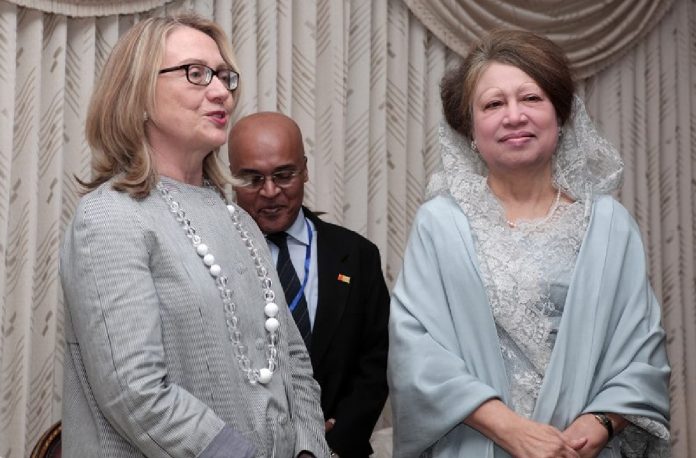Former First Lady and Secretary of State of the United States, Hillary Clinton clearly has resuscitated her old vendetta targeting Bangladesh Prime Minister Sheikh Hasina, and this time, she is not leaving any stone unturned with her vicious goal of toppling-down ruling Awami League government and replace it with Muhammad Yunus – a loyal friend, buddy and a major donor of Clinton Foundation as the next head of the government in Dhaka thus turning Bangladesh, a country blessed with massive natural and mineral resources into a fresh cash-making machine for the Clintons and their lapdogs – such as Yunus.
Until now, Clintons have succeeded in hitting Awami League by getting a massive one-sided propaganda content published in The New York Times, which has been almost immediately republished in the print editions of Indian Express, a newspaper known for its extreme bias towards the political left and Islamist. As Indian Express hates ruling Bharatiya Janata Party (BJP) and Indian Prime Minister Narendra Modi, it was an excellent opportunity for this news outlet to blow a befitting hit both on Narendra Modi and India’s most-trusted ally – Awami League and Prime Minister Sheikh Hasina in Bangladesh.
During the past several weeks, Hillary Clinton succeeded in getting few statements issued by various individuals in favor of Nobel Prize laureate controversy-plagued Muhammad Yunus by exerting her influence and using contacts. She has been frantically trying to get a statement issued by the US State Department and a bipartisan resolution introduced in the US Congress in defense of Yunus. Although it is unclear whether the US State Department would be directly involved in this matter or whether the members of the US Congress would pay attention to Hillary’s call, the United Nations has issued a statement on September 5, 2023 in favor of Muhammad Yunus.
In the statement, Office of the High Commissioner of the United Nations Human Rights said:
We are very concerned by the continued intimidation and harassment of human rights advocates and civil society leaders through legal proceedings in Bangladesh, including Nobel laureate Mohammad Yunus, known for his work on poverty alleviation through Grameen Bank, and two leaders of the respected human rights organization Odhikar.
UN High Commissioner for Human Rights Volker Türk calls on the Bangladeshi authorities to create a safe and enabling environment for human rights defenders and other civil society representatives to carry out their essential work for the welfare and protection of all people in Bangladesh.
Yunus has faced harassment and intimidation for almost a decade. He currently faces two trials that carry potential prison sentences – one on charges of violating labor laws, the second for alleged corruption.
While Yunus will have the opportunity to defend himself in court, we are concerned that smear campaigns against him, often emanating from the highest levels of government, risk undermining his right to a fair trial and due process in line with international standards.
We have also been following closely the cases brought against the leaders of the Odhikar organization, Adilur Rahman Khan and Nasiruddin Elan, in which the verdicts are due to be delivered on Thursday 7 September. The criminal charges relate to a fact-finding report they compiled 10 years ago on extra-judicial killings. Both have faced harassment and intimidation, and their organization’s license was not renewed.
The legal harassment of civil society leaders, human rights defenders and other dissenting voices, is a worrying sign for civic and democratic space in Bangladesh. These cases also represent an important test for the independence of the judiciary in Bangladesh.
The High Commissioner urges the judicial authorities to ensure the most rigorous review in these cases to ensure that rights to due process and fair trial are strictly and consistently applied.
Commenting on new Cyber Security Act which replaces previous Digital Security Act, the UN Human Rights Commission said:
We are also studying closely the new Cyber Security law which has been presented to Parliament to replace the problematic Digital Security Act. The new law will replace imprisonment with fines and increase the scope for bail for several offences, but it is very important that Parliament address the remaining concerns to prevent any further arbitrary use of the law to suppress freedom of expression.
Meanwhile, following a suggestion of Muhammad Yunus, Hillary Clinton has been trying to exert her influence on the United Nations by indefinitely banning participation of Bangladesh in the UN Peace Mission. In this regard, Clintons are also trying to tag a few more influential figures such as former President Barack Obama.




